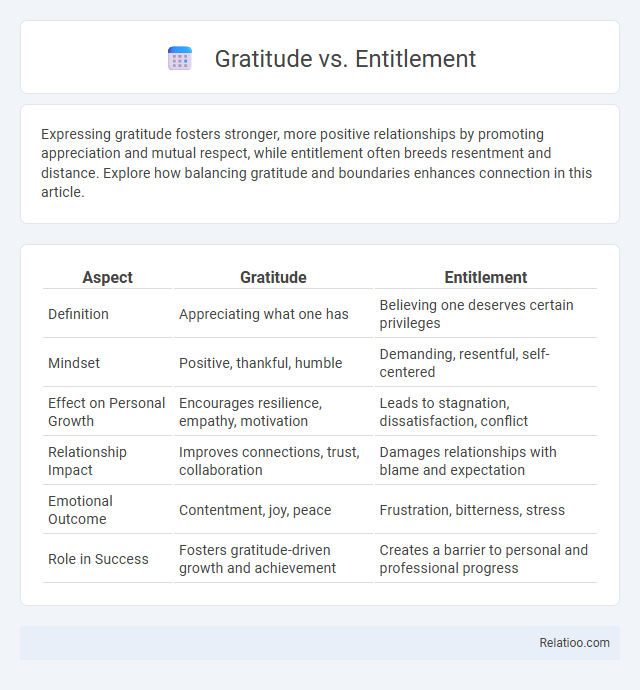Expressing gratitude fosters stronger, more positive relationships by promoting appreciation and mutual respect, while entitlement often breeds resentment and distance. Explore how balancing gratitude and boundaries enhances connection in this article.
Table of Comparison
| Aspect | Gratitude | Entitlement |
|---|---|---|
| Definition | Appreciating what one has | Believing one deserves certain privileges |
| Mindset | Positive, thankful, humble | Demanding, resentful, self-centered |
| Effect on Personal Growth | Encourages resilience, empathy, motivation | Leads to stagnation, dissatisfaction, conflict |
| Relationship Impact | Improves connections, trust, collaboration | Damages relationships with blame and expectation |
| Emotional Outcome | Contentment, joy, peace | Frustration, bitterness, stress |
| Role in Success | Fosters gratitude-driven growth and achievement | Creates a barrier to personal and professional progress |
Understanding Gratitude: Meaning and Importance
Gratitude involves recognizing and appreciating the value of what you have, fostering emotional well-being and stronger relationships. Unlike entitlement, which creates unrealistic expectations and dissatisfaction, gratitude encourages contentment and mindfulness. Cultivating gratitude boosts mental health by shifting focus from what is lacking to the abundance in your life.
The Roots of Entitlement: Origins and Effects
Entitlement often originates from unmet emotional needs in childhood, where inconsistent rewards or excessive indulgence shape expectations of privilege. This mindset can lead to impaired relationships and hinder personal growth by fostering dependence on external validation rather than internal fulfillment. Understanding these roots helps you cultivate gratitude and positivity, promoting resilience and healthier social connections.
Key Differences Between Gratitude and Entitlement
Gratitude involves recognizing and appreciating the value of what you have, fostering a positive mindset and emotional well-being. Entitlement creates an expectation of receiving something without effort or recognition, often leading to dissatisfaction and resentment. Understanding these key differences helps you cultivate genuine positivity by appreciating your experiences rather than expecting them as a right.
Psychological Benefits of Practicing Gratitude
Practicing gratitude enhances psychological well-being by promoting positive emotions, reducing stress, and increasing overall life satisfaction. Studies show that regularly expressing gratitude improves mental health, boosts resilience, and fosters stronger relationships compared to feelings of entitlement, which are linked to negative emotions and dissatisfaction. Embracing gratitude shifts focus from entitlement to appreciation, cultivating a positive mindset that supports emotional balance and long-term happiness.
How Entitlement Impacts Mental Well-being
Entitlement can severely impact your mental well-being by fostering unrealistic expectations and chronic dissatisfaction, leading to increased stress and anxiety. Unlike gratitude, which promotes a positive mindset by appreciating what you have, entitlement breeds resentment when those expectations are unmet. Cultivating positivity involves recognizing and challenging entitlement to maintain emotional balance and improve overall mental health.
Social Implications: Gratitude vs Entitlement in Relationships
Gratitude in relationships fosters mutual respect, emotional bonding, and increased cooperation, enhancing social cohesion and trust. Entitlement, however, often leads to unrealistic expectations, resentment, and conflict, weakening social connections and undermining relationship stability. Positivity contributes by promoting optimistic interactions and resilience, but without gratitude, it may fail to build deep relational satisfaction.
Cultivating Gratitude: Practical Strategies
Cultivating gratitude involves intentional practices such as daily journaling to acknowledge positive experiences and expressing appreciation to others, which fosters emotional well-being and counters entitlement. Research from positive psychology highlights gratitude's role in enhancing life satisfaction and reducing stress by shifting focus from what is lacking to what is present. Consistent mindfulness exercises can deepen awareness of daily blessings, reinforcing a gratitude mindset that promotes resilience and genuine positivity.
Recognizing and Reducing Entitlement Mindset
Recognizing an entitlement mindset involves identifying expectations of unearned privileges and a lack of appreciation for others' efforts, which contrasts sharply with genuine gratitude that acknowledges and values received benefits. Reducing entitlement requires cultivating self-awareness, practicing gratitude journaling, and emphasizing personal responsibility to shift focus from what is owed to what is earned. Developing positive thinking reinforces this transformation by fostering appreciation, resilience, and an optimistic outlook on personal growth and interpersonal relationships.
The Role of Gratitude in Personal and Professional Success
Gratitude fosters resilience and motivation by enhancing emotional intelligence and strengthening relationships, which are critical for personal and professional success. Unlike entitlement, which can lead to complacency and dissatisfaction, gratitude encourages a growth mindset that promotes continuous learning and collaboration. Companies that cultivate gratitude among employees often see increased productivity, higher morale, and reduced turnover, underscoring its vital role in organizational achievement.
Building a Gratitude-Focused Life: Next Steps
Building a gratitude-focused life begins with daily practices such as journaling three specific things you are thankful for to shift mindset from entitlement to appreciation. Incorporate mindfulness techniques to recognize and savor positive experiences, reinforcing a sustained attitude of positivity. Engaging in community service or acts of kindness creates meaningful connections that deepen gratitude and diminish feelings of entitlement.

Infographic: Gratitude vs Entitlement
 relatioo.com
relatioo.com